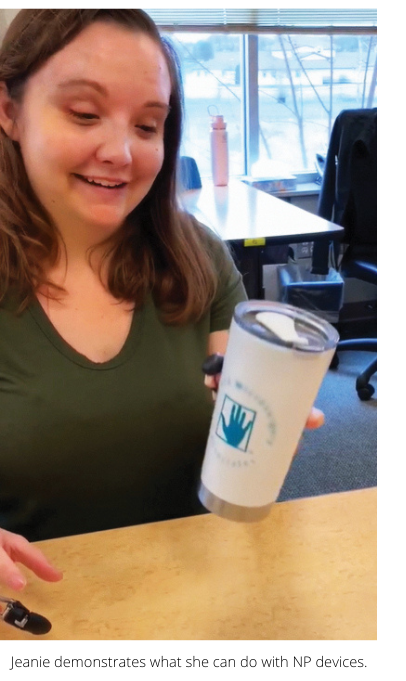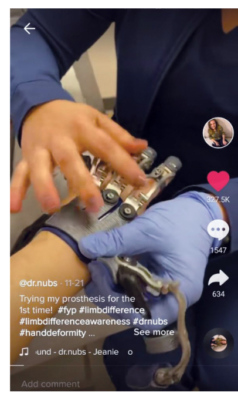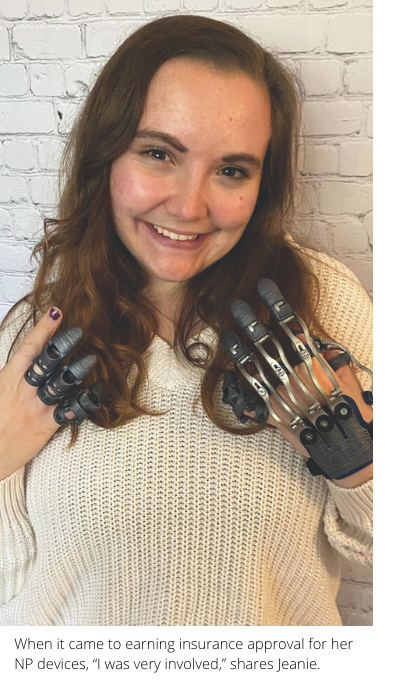Jeanie McGarvey came into the world with hand deformities. Her little fingers never fully developed due to bands wrapping around them before she was born. A sharp and inquisitive little girl, she adapted well. Blessed with lots of friends and a seemingly endless supply of energy, she never let her difference impede her. That’s not to say she wasn’t challenged, but she was motivated to accomplish the same things as her friends, as anyone.
Fast forward to high school and young Jeanie began experiencing vicious hand cramps. Many times, a family member would need to massage her hands back into a semi-relaxed state to grant Jeanie relief. “They would lock up,” Jeanie explains, “and none of the eight specialists that I saw about it could tell me why.” Neither hand, nerve, muscle nor movement specialists knew what her ailment or cause was. It was Jeanie’s dad, heartbroken over having watched his baby girl struggle to find answers, who finally suggested she visit a prosthetic specialist. It certainly couldn’t hurt to try.
That’s when she met Certified Prosthetist Orthotist (CPO) Nicole Pandora of Hanger Clinic.
“The minute I got there and told her what was going on, she had a name for it: overuse syndrome,” explains Jeanie. Another term for a repetitive motion disorder, it meant that after all of these years of determination and stamina Jeanie’s hands were tired and overworked and without intervention they wouldn’t get any better and may continue to worsen. In short, Jeanie’s hands needed a rest. Nicole suggested prosthetics. She explained to Jeanie that the proper devices could take some of the burden off of her hands and give her better functionality.

“I love to cook,” says now-25-year-old Jeanie wistfully, “And it had become increasingly difficult to manage, so that is one of the reasons I agreed.” Jeanie still wasn’t convinced that pursuing insurance approval was worth the investment of time and emotion. But with Nicole’s encouragement, she was willing to try.
“I wasn’t even sure I wanted them, but I got excited every time we submitted what the insurance company wanted,” explains Jeanie. Conversely, she was disappointed each time her claim was denied. Through all of this, Nicole was in constant communication about the process and next steps. “She really fought for me,” says Jeanie, “every step of the way.” But every time Jeanie was denied, it became harder and harder for her to continue the journey towards approval. She struggled. The extreme highs of hope and the devastating lows of denial seemed unnecessary. But Jeanie doesn’t give up easily; she knew she was going to have to persist. And persist she did.
The reasons for denial were hard to take. “The first time the insurance company said it wasn’t medically necessary,” laughs Jeanie. Jeanie and Nicole appealed that decision and met with an occupational therapist for a formal therapy evaluation that spoke to her deficits and goals. “The insurance company said that I had gotten along for 25 years without them so why did I all of the sudden think I needed them?”
It hardly seemed fair. After all, no one could deny Jeanie’s difference; it was obvious to anyone who looked closely at her hands. How could they not see that she had pushed herself so far in her 25 years that her fingers and hands just gave out? Up to that point, Jeanie had not allowed her hand deformities to get in the way of her leading a happy and productive life. But she was becoming more and more aware that no matter how strong she was mentally, she physically could not continue to do that. And, in essence, she was denied the proper assistance to help her because of her strength and determination up to that point. It felt like a slap in the face. Over and over.
The insurance company requested that Jeanie write, in her own words, a letter to explain why she felt that prosthetics were now a necessity. “They wanted to know what had changed in my abilities that suggested the devices were necessary, so I told them. And they denied me again.” The insurance company also requested a video demonstrating Jeanie’s abilities with and without prosthetics. Utilizing sample devices provided by Naked Prosthetics (not fitted to her hands for optimal performance), Jeanie was able to unscrew a lid, pick up a water bottle and more. This was met with insurance denial but after a second-level appeal, an 11-page justification document by Nicole and after a year of back and forth, Jeanie finally received approval.
Jeanie continues to go to physical therapy and is still learning what is possible with her new devices.
She proudly wears eight prostheses: four PIPDrivers, three MCPDrivers and a ThumbDriver. That is a lot to get used to when you’ve gone without for 25 years. Now muscles are used differently and need to be stretched and strengthened. Exercises include picking up objects of varying weight and size in order to help work those muscles and get her used to the sensation on her residuum and the feel of the prostheses.

Not surprisingly to those who have met her, Jeanie enjoys speaking publicly. She selflessly shares her story, her triumphs and her challenges in order to motivate others to see past their perceived deficits in order to reach their goals. She has shared her journey with social media and just recently had a video go viral (go Jeanie!) that showed off her brand-new Naked Prosthetics devices.
What does Jeanie want others to know who are facing the insurance approval process? “Don’t be afraid to ask for help. Don’t take no for an answer. If you believe in the proposed solution, keep going back and asking for it. The insurance game is not just between doctors and your advocate.”
So, what’s next, Jeanie? “Tomorrow my PT and I will work on kitchen utensils!”


